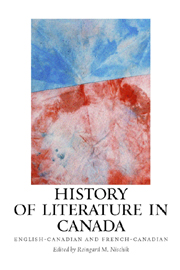Book contents
- Frontmatter
- Contents
- Acknowledgments
- Introduction: Writing a History of Literature in Canada
- I Beginnings
- II The Literature of New France, 1604–1760
- III The Literature of British Canada, 1763–1867
- IV From the Dominion to the Territorial Completion of the Nation, 1867–1918
- V The Modern Period, 1918–1967
- 11 Politics and Literature between Nationalism and Internationalism
- 12 English-Canadian Poetry, 1920–1960
- 13 The English-Canadian Novel and the Displacement of the Romance
- 14 The Modernist English-Canadian Short Story
- 15 Early English-Canadian Theater and Drama, 1918–1967
- 16 French Canada from the First World War to 1967: Historical Overview
- 17 French-Canadian Poetry up to the 1960s
- 18 The French-Canadian Novel between Tradition and Modernism
- 19 The French-Canadian Short Story
- 20 French-Canadian Drama from the 1930s to the Révolution tranquille
- VI Literature from 1967 to the Present
- Further Reading
- Notes on the Contributors
- Index
19 - The French-Canadian Short Story
from V - The Modern Period, 1918–1967
Published online by Cambridge University Press: 12 September 2012
- Frontmatter
- Contents
- Acknowledgments
- Introduction: Writing a History of Literature in Canada
- I Beginnings
- II The Literature of New France, 1604–1760
- III The Literature of British Canada, 1763–1867
- IV From the Dominion to the Territorial Completion of the Nation, 1867–1918
- V The Modern Period, 1918–1967
- 11 Politics and Literature between Nationalism and Internationalism
- 12 English-Canadian Poetry, 1920–1960
- 13 The English-Canadian Novel and the Displacement of the Romance
- 14 The Modernist English-Canadian Short Story
- 15 Early English-Canadian Theater and Drama, 1918–1967
- 16 French Canada from the First World War to 1967: Historical Overview
- 17 French-Canadian Poetry up to the 1960s
- 18 The French-Canadian Novel between Tradition and Modernism
- 19 The French-Canadian Short Story
- 20 French-Canadian Drama from the 1930s to the Révolution tranquille
- VI Literature from 1967 to the Present
- Further Reading
- Notes on the Contributors
- Index
Summary
THROUGHOUT THE NINETEENTH CENTURY and at least until the 1940s, the development of the French-Canadian short story, both thematically and formally, paralleled that of the novel. The generic boundaries of the novel and the different forms of short prose cannot always be clearly determined, and scholars and the authors themselves are often vague in their distinction between nouvelle, conte, histoire, récit, légende, chronique, and mémoire. Thus, Patrice Lacombe's La terre paternelle (1846) has been categorized both as a novel and as a nouvelle, Albert Laberge's La Scouine (1918) has occasionally been regarded as a short-story collection, and Jacques Ferron's novels as “grands contes.”
In the first decades of the twentieth century, authors such as Adjutor Rivard, Lionel Groulx, Frère Marie-Victorin, Damase Potvin, Clément Marchand, and Blanche Lamontagne-Beauregard produced short prose that was ideologically indebted to agriculturalism and focused on French-Canadian country life being threatened by rural exodus, technology, and Americanization. In these works, the francophone population represents both the values inherited from France and those of Catholicism. Literary adaptations of historical events and picturesque depictions of country life — all claiming to be anthropologically authentic — resulted in an idealizing realism. The authors of the 1920s such as Frère Marie-Victorin (1885–1944) particularly emphasized the “vieilles choses, vieilles gens,” which were folkloristically overdrawn and enjoyed great popularity. Only a few writers managed to break away from the agriculturalist and moralizing discourse dominating the majority of short stories, most of them published in periodicals.
- Type
- Chapter
- Information
- History of Literature in CanadaEnglish-Canadian and French-Canadian, pp. 264 - 269Publisher: Boydell & BrewerPrint publication year: 2008



